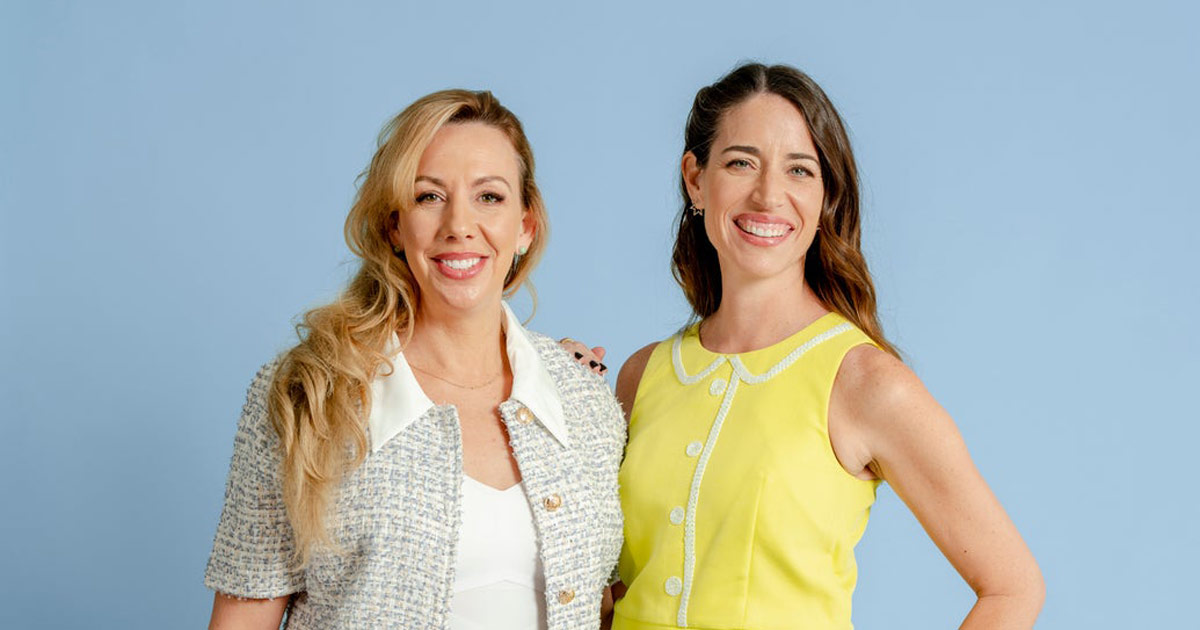
Falling down a rabbit hole in pursuit of an elusive white rabbit is the first of many fantastical experiences for a young girl in Alice’s Adventures in Wonderland. A journey filled with unexpected events is an apt comparison for what many small business owners encounter in entrepreneurship. That’s why Carolyn Rodz and Elizabeth Gore drew inspiration from the classic book when launching Hello Alice, a small business platform that connects entrepreneurs with financing opportunities and facilitates a supportive, like-minded community. Like the fictional Alice, they’ve also experienced some “curiouser and curiouser” events in their founding journey.
A tent atop a mountain, rather than a rabbit hole, marked the beginnings of Hello Alice. During a conference in 2015, the future co-founders started talking about a mutual passion to address the problem of equity in the small business space. They only loosely knew one another then, despite much overlap—both women grew up in Houston, graduated from Texas A&M University and have connections to Bolivia. (Rodz was born there; Gore spent time there while in the Peace Corps).
Disparate journeys ultimately brought the co-founders to the same place. Rodz was a two-time entrepreneur who had most recently launched a virtual accelerator for female founders. Gore worked for the United Nations for nearly a decade, including on the UN Foundation’s Global Entrepreneurs Council, before becoming an entrepreneur-in-residence at Dell Technologies.
Their different perspectives quickly aligned. “Both of us saw this incredible opportunity to build more equity and more efficiencies into the small business ecosystem and how that benefited every stakeholder,” Rodz says.
What is Hello Alice? Moms raising babies and growing a business
Come 2016, Hello Alice was in its infancy, and Rodz and Gore were second-time moms to new babies. They were bootstrapping the company when they got an opportunity to build out the costly data infrastructure for the platform at a lab backed by Michael Dell, the billionaire tech mogul. The problem? They needed to be in San Francisco; Gore lived two hours north of the city, but Rodz was hundreds of miles away in Houston.
“I knew Carolyn—not that well—[and] I was like, ‘Well, you could move in with me, and we could commute down to the city together,” Gore says.
Thus began a six-month adventure that saw the Rodz and Gore families living together while the co-founders shared a babysitter and swapped caretaking and business-building duties. Six days a week, one or both of them would board a $7 bus to San Francisco, often departing around 5 a.m. so they could make it back by bedtime with the kids.
“That time was full of motherhood and fighting for capital and building and excitement and tears—and it was incredible,” Gore says. While she describes it as “the craziest time,” the experience also showed they could work together to build a successful company.
Success in shared values
That time together also meant the co-founders really got to know each other. Rodz describes the duo as having “a certain chemistry,” while Gore likens their partnership to a marriage, with highs, lows and a decision to stick together because of a strong foundation of shared values. They even play off each other’s attributes: Rodz is the visionary and a night owl, whereas Gore is the executor and a morning person.
The women quickly aligned on core values for growing Hello Alice and developed a deep admiration for each other. “I think it’s evident when you meet Elizabeth and myself how much we really value the other, and we’re constantly reminding each other of how much we value the other,” Rodz says.
But a successful business requires more than a successful partnership.
Since its founding, Hello Alice has grown to serve 1 million-plus entrepreneurs—an achievement they hit much sooner than the co-founders expected, prompting them to revise their “north star” to 2 million entrepreneurs, Gore says. Now valued at more than $100 million—bigger than some small banks—the company’s goal is to be profitable within the next year or so, she adds, though they prefer to measure the company’s success as a by-product of the success of its small business community.
The company has a few different ways of trying to achieve its goal of helping build the healthiest, strongest and most sustainable businesses, Rodz says. The platform connects entrepreneurs with financing resources via credit, grants and loans, and fosters a collaborative community of small business owners who support one another.
Hello Alice: Small business pioneers
In April, the company debuted a new feature: the business health score. This is designed to help small business owners prepare for long-term success and allows Hello Alice to offer tailored information as a business’ health score changes. Hello Alice uses this information to track the health of its user base, and it also measures its business with the tool, Rodz notes.
Still, like any adventure, there have been surprises along the way. Gore chalks up lessons learned that include spending too much time raising venture capital rather than focusing on sales and hiring too slowly and not firing fast enough. Meanwhile, Rodz says it took them a bit to find their lane in the small business space. Although she’s learned something at every stage of Hello Alice’s journey that she strives to share with their community—from how to effectively manage a team to how to scale technology—some of her best teachings came from her first business that ultimately failed.
One challenge that persists for both Hello Alice and its community of small business owners is access to capital. As Rodz learned following her prior business pursuits, even the same entrepreneur can have very different experiences, based on their knowledge and access to resources, she says.
And that means there’s still more work to do to support small businesses. “I would like to be seen as a full disruptor—that we stomped out the predatory credit industry, that we have provided the appropriate commercially valuable tools, that that industry just dies away because we are a better alternative to that,” Gore says.
Why technology is at the core of Hello Alice
Providing equal access to funding to small business owners previously left out of the conversation is core to Hello Alice—but it wouldn’t be possible without technology. The company’s free platform is powered by machine-driven technology that helps entrepreneurs access credit, loans and grants.
It was while running a small business accelerator prior to launching Hello Alice when inspiration struck Rodz. Even though she and her colleagues were repeatedly answering the same types of questions, solving the same problems and connecting entrepreneurs with the same types of resources, there weren’t one-size-fits-all answers. Rather, solutions varied based on things such as where entrepreneurs were located and the type of company they were running.
“That’s when a lightbulb went off,” Rodz says. Utilizing technology could help tailor responses from a limited subset, based on an owner’s personal or business profile, making the experience more efficient and scalable, she adds. But there are still daily reminders that make their work both gratifying and satisfying—such as when a small business owner emails to share good news about information they found via Hello Alice.
“I think I have one of the greatest jobs in the world,” Rodz says. “This is work that absolutely has to be done.”
The value of believing in your mission
Gore and Rodz founded a for-profit company driven by a mission to ensure every entrepreneur in the “new majority”—women, people of color, members of the LGBTQ+ community, veterans and people with disabilities—has access to funding, networks and services to grow their small business. That mission may not seem so radical now, but the co-founders were trying to address issues in small business equity even before some major cultural events shifted the dialogue in their favor.
That’s because Hello Alice predates the #MeToo movement in 2017 that sparked conversations about gender equity, the murder of George Floyd in 2020 that ignited more frank discussions about racial inequities and the COVID-19 pandemic that highlighted the need for small businesses. “I don’t like saying we were right because we didn’t know all that was coming,” Gore says.
“We’ve been here for a long time,” Rodz adds. “We were in the totally wrong place at the wrong time for years, but we believed in our mission and we knew there was value, and we knew everybody stood to benefit if we could just make it happen. And it’s been incredible and rewarding to see resources open up, but I think the idea that any part of that journey was easy is very untrue.”
Despite pressure, Hello Alice stays true to their cause
Part of believing in their mission also meant proving Hello Alice was a viable for-profit company, even though they were getting pushed in those early days to structure as a nonprofit, Rodz notes. “If small business owners succeed, governments succeed, corporations succeed, all of the vendors selling into these small business owners succeed, certainly the small business owners succeed,” she says. “Surely, there was a piece of that pie to generate a profitable business entity from.”
As for where Hello Alice may prove to be an early leader once again, Rodz is focused on how the company can help build a more equitable and transparent underwriting process. Doing so will address a core fundamental problem, which is that banks and venture capitalists continue to rely on “incredibly limited” data to make underwriting decisions that often ignore qualitative attributes such as an entrepreneur’s scrappiness or leadership abilities.
Photo by ©Cayce Clifford/courtesy of Hello Alice.




